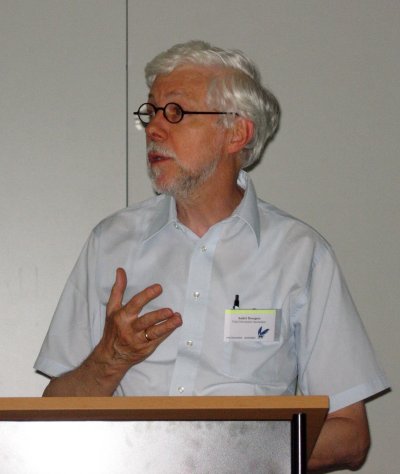Amsterdam GloPent Conference Report
The second international conference of the “European Research Network on Global Pentecostalism” (GloPent) was hosted in Amsterdam on 27 and 28 April, 2007. This conference was titled “The Interdisciplinary Study of Global Pentecostalism” and is one of three in a series of workshops aimed at producing a study guide to global Pentecostalism.
 Stephen Hunt
Stephen Hunt
Prof Allan Anderson
(University of Birmingham) considered paradigms in mission studies and
how these paradigms influence the study of Pentecostal missions.
Concluding that the objectives and aims of any study of Pentecostalism
mission must be clearly outlined beforehand, Anderson determined some
of the most important parameters to be defined in the study of
Pentecostal missions.
Prof Amos Yong (Regent
University) reflected on the debate of theology of religions, outlining
and criticizing the predominant typology of exclusivism, inclusivism,
and pluralism. Presenting the contours of an emerging pneumatological
paradigm, he suggest how a Pentecostal approach to the interreligious
encounter might move beyond this typology, enrich Christian beliefs
about the religions, and invigorate a more hospitable form of practices
related to people of other faiths.
Prof Joel Robbins
(University of California) disentangled the elaborately
interdisciplinary discourse of Pentecostal studies to determine what
contributions to it have been made by distinctly anthropological
threads. He pointed to three areas where such contributions had been
made: studying Pentecostalism as a distinct cultural process,
understanding Pentecostalism as a lived religion, and examining the
relationship of Pentecostalism to modernity.
 Birgit Meyer
Birgit Meyer
Prof Stephen Hunt (University
of the West of England) considered the virtues of ‘macro’ and ‘micro’
perspectives in discussing the contribution of sociology to the study
of both ‘classical’ and ‘neo’ Pentecostalism. In doing so, he explored
several themes: the origins of Pentecostalism in the USA and Europe,
the relationship between Pentecostalism and modernization, the rise of
neo-Pentecostalism, routinization and revivalism, Pentecostalism and
politics, gender dimensions in Pentecostalism, black Pentecostalism,
and more.
Dr. Stefan Huber (Kompetenzzentrum Orient-Okzident Mainz) discussed psychological research on Pentecostalism, confronting the earlier psychopathological frameworks of such studies with newer research based on general psychological categories. On the basis of Glock's multidimensional model of religiosity, recent psychological studies on Pentecostal piety were reviewed with regard to their indications of the inner structures and dynamics of personal religious systems of Pentecostals.
These presentations were complemented with responses by Prof Cornelis van der Laan (Free University of Amsterdam), Prof Michael Bergunder (University of Heidelberg), Prof Birgit Meyer (Free University of Amsterdam), Prof Hijme Stoffels (Free University of Amsterdam), and Dr Mark Cartledge (University of Birmingham), as well as the ensuing discussions.
In addition, six current projects by PhD and post-doctoral researchers from Amsterdam, Basel, Birmingham and Heidelberg were presented:
 André Droogers
André Droogers
- “The Use of Media Technology in Transnational Pentecostalism: The Case of Yoido Full Gospel Church's Development in Japan” (Ikuya Noguchi, Free University of Amsterdam),
- “Digging Beneath Azusa Street: The Contribution of Joseph Smale within Pentecostal Historiography” (Timothy Welch, University of Birmingham),
- “The Pedagogy of Conversion. Religious Formation in Chilean Pentecostal Churches” (Daniel Frei, Basel),
- “Pentecostal Passion Paradigm: The (In)Visible Framing of Gibson's Christ in a Dutch Pentecostal church” (Miranda Klaver, Free University of Amsterdam),
- “Inculturation
and the Christ Apostolic Church in Nigeria” (Michaiah Olaniyi, University of Birmingham), and
- “Pentecostal Youth in a South German City” (Claudia Hesse-Böhme, University of Heidelberg).

